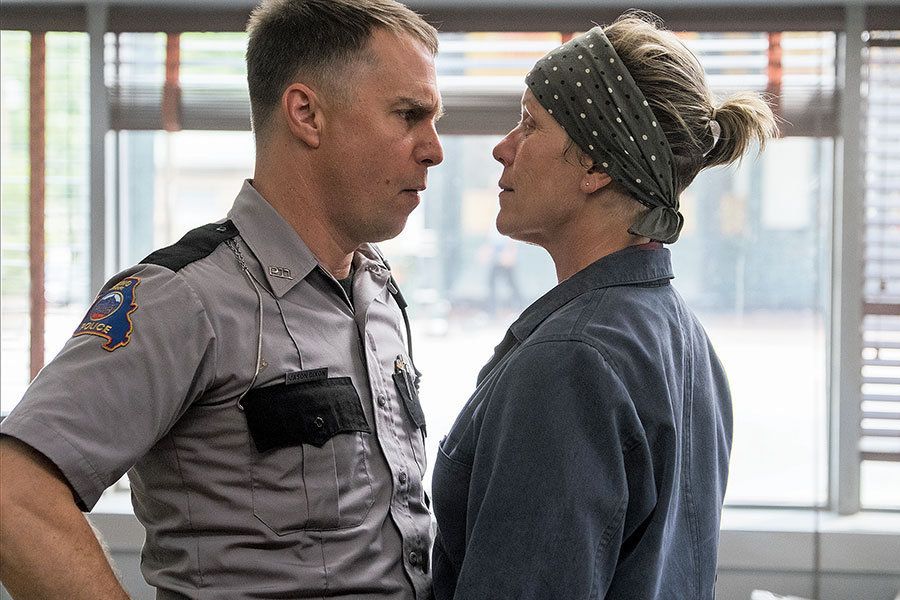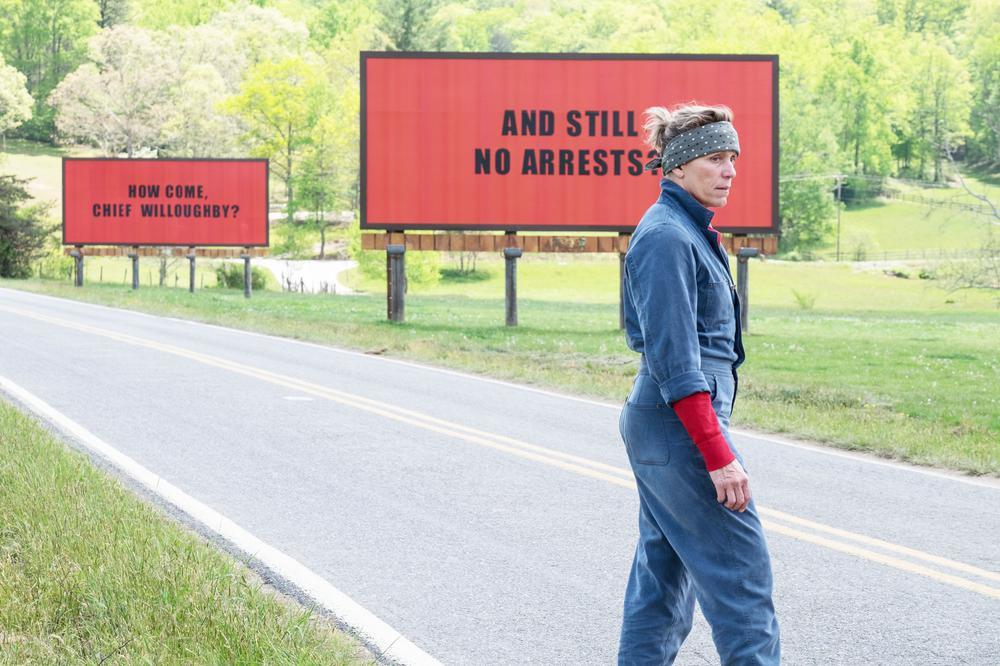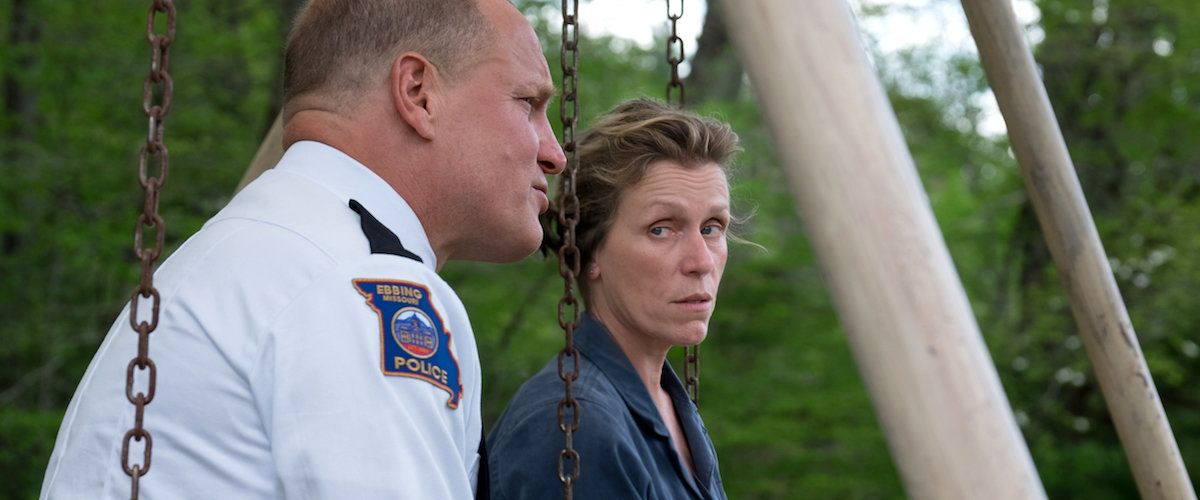A film festival darling, it is hard to know what to make of Martin McDonaugh’s Three Billboards Outside Ebbing, Missouri from the trailer that blended a harsh topic with equally harsh humor, to the third act of the movie where after several twists you are laughing through fear, comedy, and sheer exhaustion. The dark comedy teeters between its humor and anxiety-inducing tension, but never strays far from either, each joke undercut by an underlying emotional heft and each tense moment followed by an unexpected lightness. It’s disorienting in the best way, keeping you on your toes like — if I can make a fitness metaphor — changing your workouts to keep your muscles on guard. The result are scenes so jarring they evoke the realism of a film based on a true story, with its realism nearly stranger than fiction. Simply put, of the few pleasant surprises this year, Three Billboards Outside Ebbing, Missouri is among the best.
Three Billboards follows Mildred Hayes, played by Frances McDormond in a performance so stunning it joins the ranks of characters you couldn’t imagine being played by any other performer. After her daughter’s rape and murder, which takes place off-screen and prior to the movie’s start, desperation leads Mildred on a PR campaign to draw attention to the police department that has failed to find her rapist in a case gone cold. Her idea strikes as she drives by three dilapidated billboards on a nearly abandoned road, leading her to spend the little money she has — and some that she doesn’t — to put the Ebbing, Missouri police department’s feet to the fire. She names the police chief by name, Bill Willoughby, played by Woody Harrelson, in a calculated risk to strike accountability at the chance of drawing the ire of everyone in town. Chief Willoughby is beloved, but even worse, is dying of cancer, a fact that a hardened Mildred Hayes disregards in comparison to justice for her daughter. The stunt turns into a conflict weighed in the jury of public opinion: Mildred Hayes, sympathetic to the audience, versus Chief Willoughby, his sidekick Jason Dixon (Sam Rockwell), and the Ebbing police department with the loyalty of nearly everyone in Ebbing, Missouri.
It is here themes of racism, class, and police brutality is drawn out and tied inextricably to the plot of Three Billboards. The Ebbing police department is known by to be a violent display of uncontrolled authority, only primarily focused on Blacks. Whites, on the other hand, are less a victim of their corruption, but still suffer from it at the department’s will, or in Midlred’s case, their ineptitude that likely killed any chance of justice for her daughter’s rape and murder. Still, Chief Willoughby is known to the people as a good man, a man to whom they are loyal, for whom they would make Mildred Hayes’ life hell to end her campaign with those three billboards. Her son becomes the target of bullying, her family cast in an even darker shadow, herself the subject of intimidation and threats, yet Mildred does not bend, showing tender moments only sporadically that betray no weakness, but rather an unending willfulness to see things through no matter the harm that comes her way. Nothing she faces could be worse than what her daughter did, and given flashbacks of she and her daughter, Mildred seems to feel deserving of whatever comes.
The film does not sensationalize the brutality of rape, addressing it as horrific without any scenes onscreen, flashback or otherwise. Instead, we are trusted to know the act as deplorable and that Mildred’s daughter’s death was horrible, sight unseen, and thankfully so. A similar approach is taken to physical abuse against Mildred, a survivor of domestic assault. Mildred unabashedly speaks of her ex-husband as an abuser, refusing to be shamed about it even in the face of physical danger in the present. Her family is a poor, argumentative, rural one, a source of the tragedy and humor that anchor the film. Mildred can go from arguing with her son to being threatened by her ex-husband to her son putting a knife to her ex-husband’s throat to protect her, all before a ditzy teenager interrupts to say something hilariously stupid.
Largely unseen are the people who simply want Frances to get over it, represented through news stories and words of support to the police. Their presence is felt everywhere throughout the film, their motive a reflection of our deifying of police as good, honorable people uniformly deserving of support. That deifying makes Ebbing, Missouri side with the police even against a grieving mother and a crime they would otherwise rebuke as unforgiveable. Frances persists though, her exhaustion an ever-present feature of her being, perseverance making her a crowd favorite.

Ultimately, Three Billboards Outside Ebbing, Missouri is a revenge film of a new kind, a hard twist at the subgenre otherwise led by men whose violence spearheads their campaign. It’s a welcome subversion, and the darkness — and ridiculousness — that follow make for a film so much stranger than fiction that it feels like reality. With twists and jarring turns too good to spoil, Three Billboards is the must-see surprise of the year. Address your awards to Frances McDormond.
Are you following Black Nerd Problems on Twitter, Facebook, Tumblr or Google+?




Show Comments